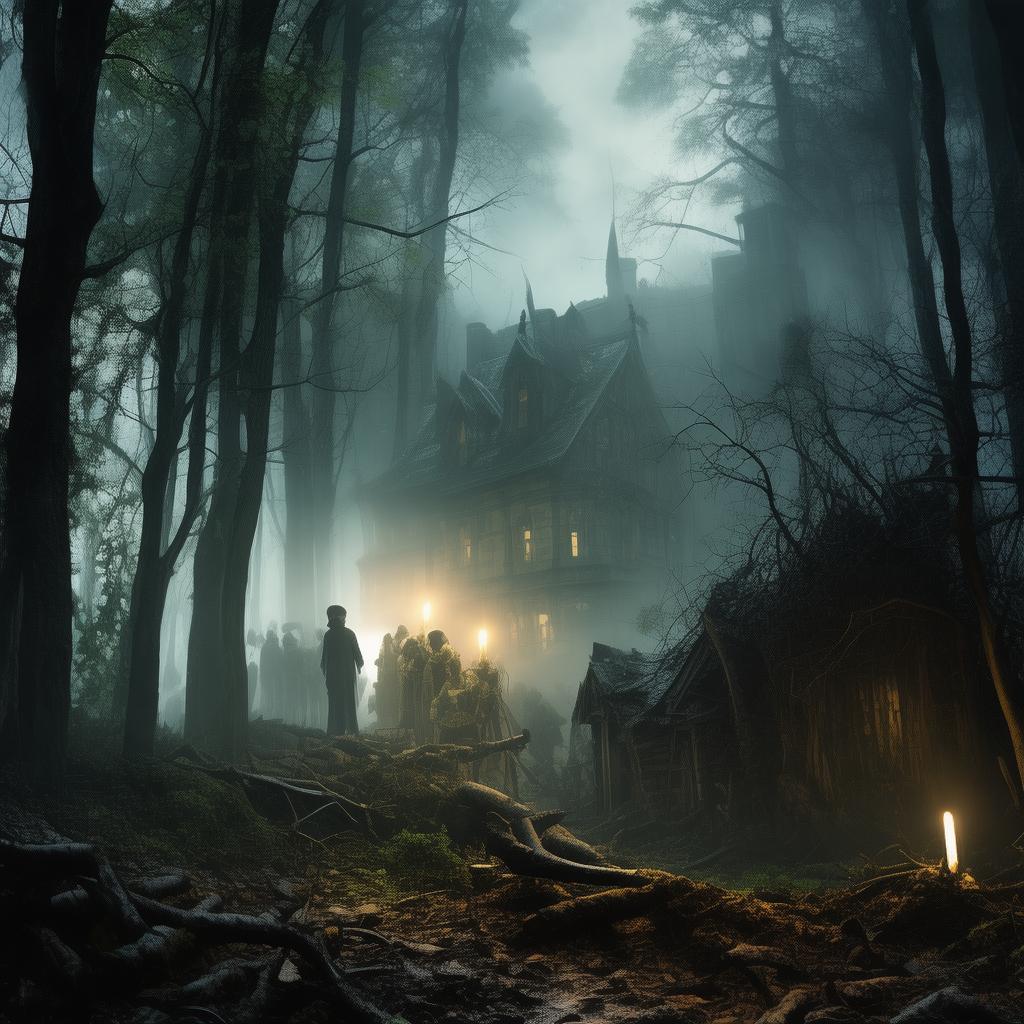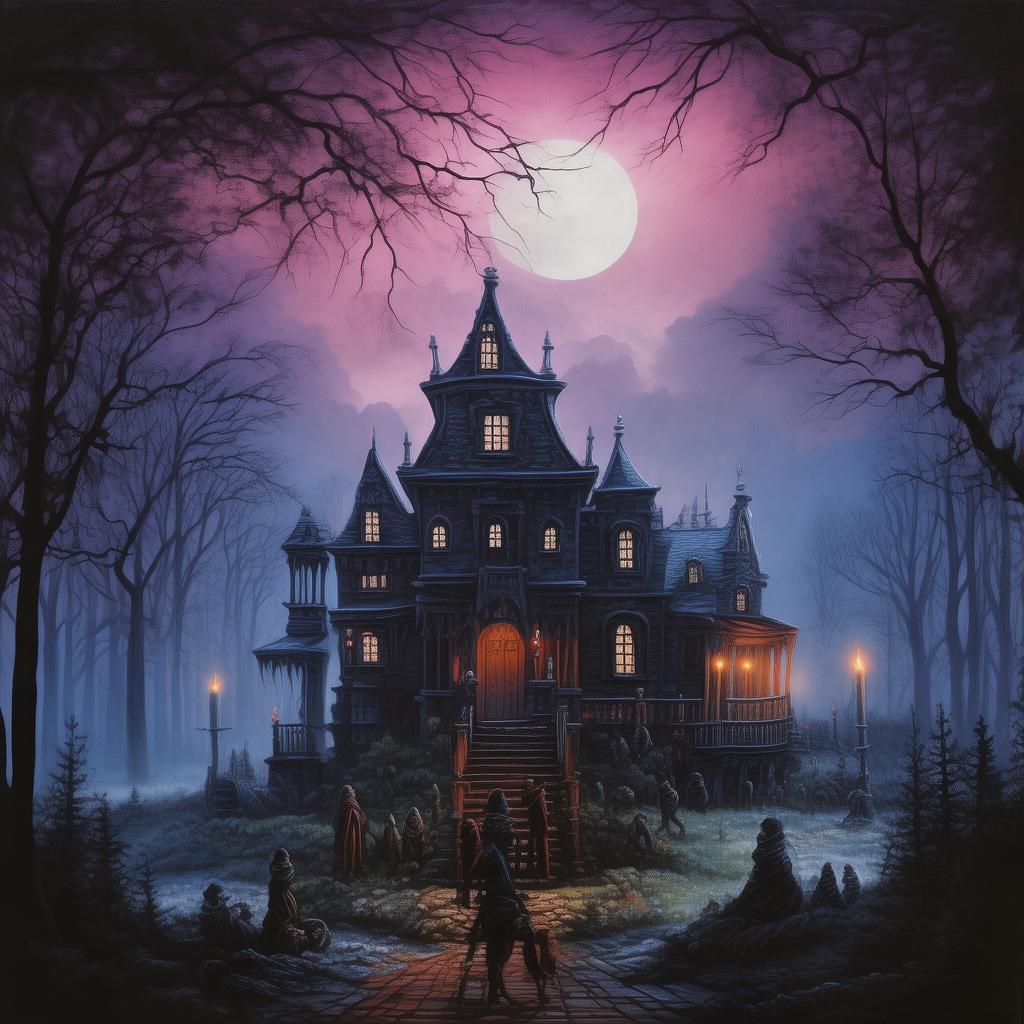The Phantom's Lament: A Haunting Requiem
The old opera house stood at the edge of the town, its grand facade now cloaked in ivy and shadows. The grand chandelier that once glittered with the promise of grand performances now hung motionless, a silent witness to the decay that had seeped into every crevice of the building. The townsfolk whispered of the opera house, of its spectral inhabitants, and of the curse that seemed to follow those who dared to enter.
The story began on a rainy night, when young Emily, a passionate music enthusiast, stumbled upon the dilapidated building while searching for inspiration for her upcoming composition. Driven by curiosity and a longing for the supernatural, she pushed open the creaking doors and stepped inside, her heart pounding with anticipation.
The grand hall was a ghostly echo of its former glory. The once opulent red velvet seats were now faded and worn, and the stage, once the stage for operas and ballets, was now a scene of desolation. Emily wandered through the silent aisles, her eyes scanning the darkened space, when she noticed a faint, eerie melody floating through the air.
It was the hauntingly beautiful voice of a soprano, one that seemed to come from nowhere and everywhere at once. The melody was haunting, beautiful, and at the same time, terrifying. Emily followed the sound, her footsteps echoing through the empty hall, until she reached the stage. There, standing in the spotlight, was a ghostly figure, a woman with long, flowing hair and a dress that seemed to be made of the very air she breathed.

The ghostly woman, known to the townsfolk as Elara, had once been the prima donna of the opera house. Her voice had been the soul of the place, her performances the lifeblood of the community. But a tragic accident had left her paralyzed, and with her voice gone, she had become trapped in this place, her spirit unable to move on.
"Who are you?" Emily asked, her voice trembling with fear and wonder.
"I am Elara," the ghost replied, her voice a haunting whisper. "I have been waiting for someone like you to hear my song. You have the gift to give it back to me."
Emily, taken aback by the ghost's words, felt a strange connection to her. She had always felt a calling to compose music that spoke to the soul, and now, standing in the presence of Elara, she knew she had to help.
"I will write a song for you," Emily promised, her heart swelling with determination.
Days turned into weeks as Emily toiled over her composition. She would hear Elara's voice in her dreams, guiding her notes and melodies. The town's whispers grew louder, some encouraging Emily, others warning her of the dangers of dealing with the supernatural.
Finally, the day of the opera house's grand reopening arrived. The town was abuzz with excitement, and Emily stood on the stage, her heart pounding. She began to sing, her voice a blend of her own and Elara's, a hauntingly beautiful melody that seemed to resonate with the very walls of the opera house.
As the final note echoed through the hall, the audience erupted into applause. Emily turned to see Elara, now in full form, her body whole once more. Her spirit had been freed by the power of Emily's music, and she was free to move on to the afterlife.
The opera house was reborn, not as a place of tragedy, but as a beacon of hope and beauty. Emily's composition, "The Phantom's Lament," became an instant classic, a testament to the power of music and the enduring spirit of those who loved it.
But as the years passed, the townsfolk noticed a strange phenomenon. Whenever the opera house was silent, the melody of "The Phantom's Lament" would float through the air, a haunting reminder of the curse that had once plagued the building. It was said that anyone who heard the melody and did not recognize its origin would find themselves drawn to the opera house, never to return.
Emily, now a celebrated composer, often returned to the opera house, her heart heavy with the knowledge of the curse she had unleashed. She vowed to protect the innocent from the ghost's call, but the question remained: Could the melody ever be truly silenced, or was it a reminder that some spirits would never rest until their song was heard once more?
✨ Original Statement ✨
All articles published on this website (including but not limited to text, images, videos, and other content) are original or authorized for reposting and are protected by relevant laws. Without the explicit written permission of this website, no individual or organization may copy, modify, repost, or use the content for commercial purposes.
If you need to quote or cooperate, please contact this site for authorization. We reserve the right to pursue legal responsibility for any unauthorized use.
Hereby declared.









